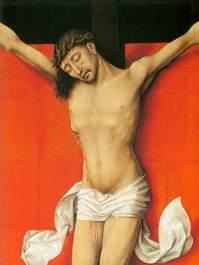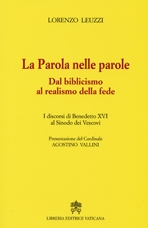 In this photo taken April 26, is a chip containing the entire Hebrew Bible at the Technion University in Haifa. During a May 11 reception at the residence of Israel's president, Shimon Peres, Benedict XVI will receive this 300,000-word Hebrew text of the Jewish Bible inscribed on a silicon particle the size of a grain of sand, using nanotechnology. The chip is read through a microscope which makes it a tad difficult for lectio and proclamation in a synagogue or a church.
In this photo taken April 26, is a chip containing the entire Hebrew Bible at the Technion University in Haifa. During a May 11 reception at the residence of Israel's president, Shimon Peres, Benedict XVI will receive this 300,000-word Hebrew text of the Jewish Bible inscribed on a silicon particle the size of a grain of sand, using nanotechnology. The chip is read through a microscope which makes it a tad difficult for lectio and proclamation in a synagogue or a church.
Sacred Scripture: April 2009 Archives
The Pontifical Biblical Commission (PBC) during their annual plenary assembly this week has been working on the theme of "Inspiration and Truth in the Bible," as a result of the October 2008 synod of bishops on the Word of God.
In his address to the PBC the Pope spoke of the importance of sacred Scripture because it "concerns not only believers, but the Church herself, because the Church's life and mission necessarily rest upon the Word of God, which is the soul of theology and, at the same time, the inspiration of all of Christian life...the interpretation of sacred Scripture is of vital importance for Christian faith and for the life of the Church."
According to the Holy Father: "From a correct approach to the concept of divine inspiration and truth in sacred Scripture derive certain norms that directly concern its interpretation. The Constitution Dei Verbum, having affirmed that God is the author of the Bible, reminds us that in sacred Scripture God speaks to mankind in a human manner. For a correct interpretation of Scripture we must, then, carefully examine what the hagiographers really sought to say and what God was pleased to reveal with their words."
Drawing his remarks from the Second Vatican Council, the Pope reminded the PBC --and us-- that are "three perennially valid criteria for interpreting sacred Scripture in accordance with the Spirit that inspired it. In the first place, great attention must be given to the content and unity of the whole of Scripture. Indeed, however different the books it contains may be, sacred Scripture is one by virtue of the unity of God's plan, of which Jesus Christ is the center and the heart. In the second place, Scripture must be read in the context of the living tradition of the entire Church [because tradition] carries the living memory of the Word of God, and it is the Holy Spirit who provides her with the interpretation thereof in accordance with its spiritual meaning. The third criterion concerns the need to pay attention to the analogy of the faith; that is, to the cohesion of the individual truths of faith, both with one another and with the overall plan of Revelation and the fullness of the divine economy enclosed in that plan.
Thinking with the Church the work of scholars, in the mind of the mind of the Holy Father, is to "contribute, following the above-mentioned principles, to a more profound interpretation and exposition of the meaning of sacred Scripture. The academic study of the sacred texts is not by itself sufficient. In order to respect the coherence of the Church's faith, Catholic exegetes must be careful to perceive the Word of God in these texts, within the faith of the Church. The interpretation of sacred Scriptures cannot be merely an individual academic undertaking, but must always be compared with, inserted into, and authenticated by the living tradition of the Church. This norm is essential in order to ensure a correct and reciprocal exchange between exegesis and Church magisterium. Catholic exegetes do not nourish the individualistic illusion that biblical texts can be better understood outside the community of believers. The opposite is true, because these texts were not given to individual scholars 'to satisfy their curiosity or to provide them with material for study and research.' The texts inspired by God were entrusted to the community of believers, to the Church of Christ, to nourish the faith and to guide the life of charity. Sacred Scripture is the Word of God in that is written down under the inspiration of the Holy Spirit. Tradition, on the other hand, integrally transmits the Word of God as entrusted by Christ the Lord and by the Holy Spirit to the Apostles and their successors so that they, illuminated by the Spirit of truth, could faithfully conserve, explain and spread it through their preaching. Only within the ecclesial context, can Sacred Scripture be understood as the authentic Word of God which is the guide, norm and rule for the life of the Church and the spiritual development of believers."
If this is certain, then it means "rejecting all interpretations that are subjective or limited to mere analysis [and therefore] incapable of accepting the global meaning which, over the course of the centuries, has guided the Tradition of the entire people of God."
Am I a stone, and not a sheep,
 That I can stand, O Christ, beneath Thy cross,
That I can stand, O Christ, beneath Thy cross,
To number drop by drop Thy Blood's slow loss,
And yet not weep?
Not so those women loved
Who with exceeding grief lamented Thee;
Not so fallen Peter weeping bitterly;
Not so the thief was moved;
Not so the Sun and Moon
Which hid their faces in a starless sky.
A horror of great darkness at broad noon -
I, only I.
Yet give not o'er
But seek Thy sheep, true Shepherd of the flock;
Greater than Moses, turn and look once more
And smite a rock.
Christina Rossetti
 Only a few months after the 12th General Assembly of the Synod of Bishops on The Word of God in the Life and Mission of the Church (in Italian now), Vatican Radio hosted the book launch of The Word in words: From Biblicism to the realism of the faith. Written by Monsignor Lorenzo Leuzzi, director of the Office for Pastoral Care of Universities of the vicariate of
Only a few months after the 12th General Assembly of the Synod of Bishops on The Word of God in the Life and Mission of the Church (in Italian now), Vatican Radio hosted the book launch of The Word in words: From Biblicism to the realism of the faith. Written by Monsignor Lorenzo Leuzzi, director of the Office for Pastoral Care of Universities of the vicariate of
"The most important thing is to help the Church rediscover the presence of the Word -- to see that the Church is not the only place Scripture is to be read, but is the place where man can truly find God through Scripture in a greater experience. Because the Word is not just in the Scriptures, but the Word is present in history."
"I'm happy to acknowledge with gratitude that there are many young people who, through the Bible, deepen their faith in God -- One in Three, Father, Son, and Holy Spirit -- because in the words of the Bible they discover the Word that is Jesus Christ, who leads us to adore God the Father, with the grace that the Holy Spirit offers us in abundance."

